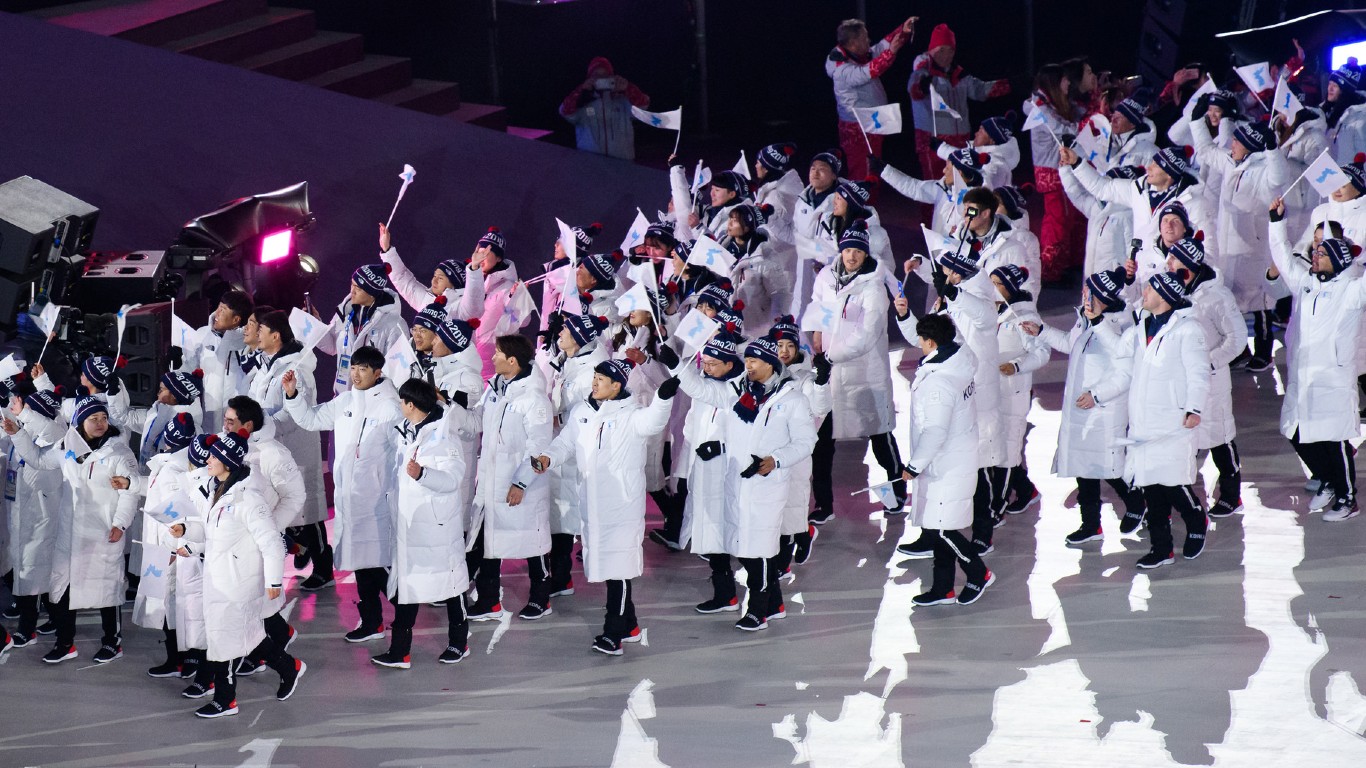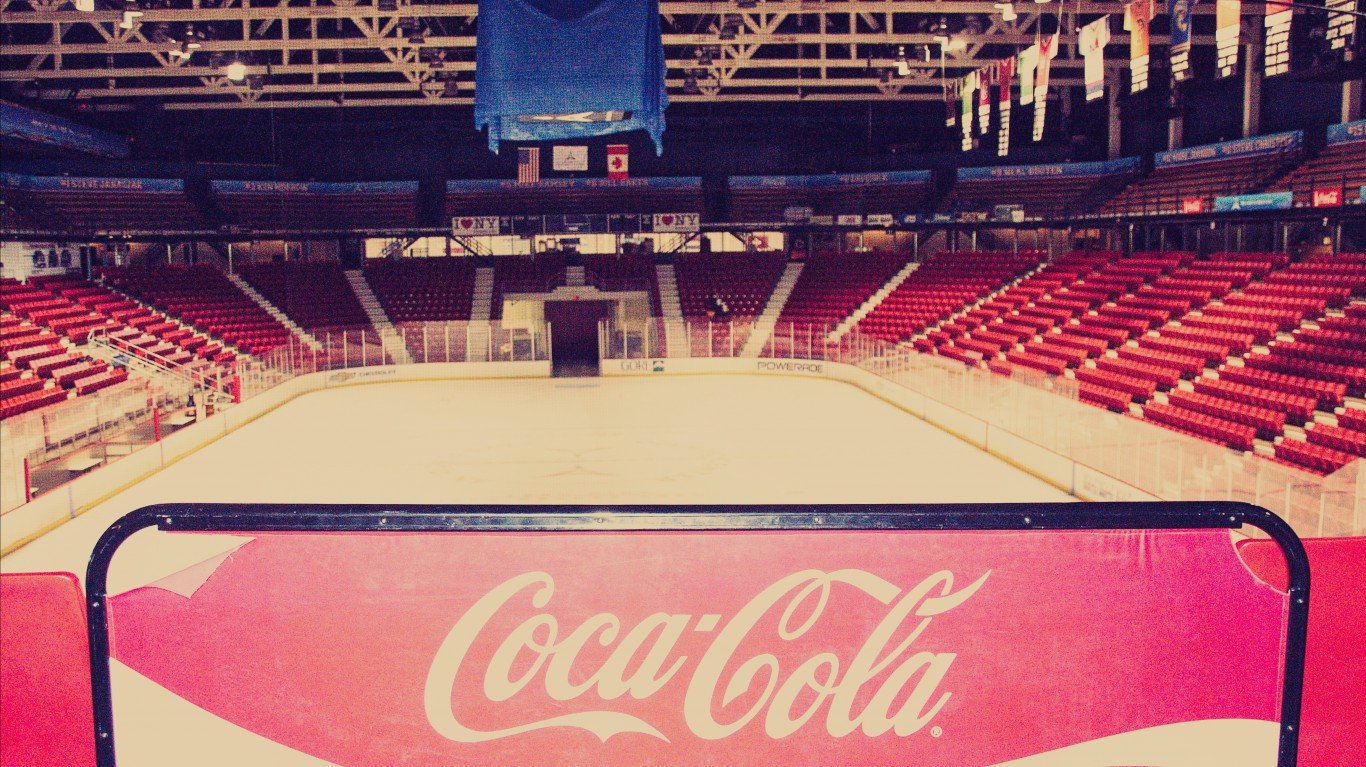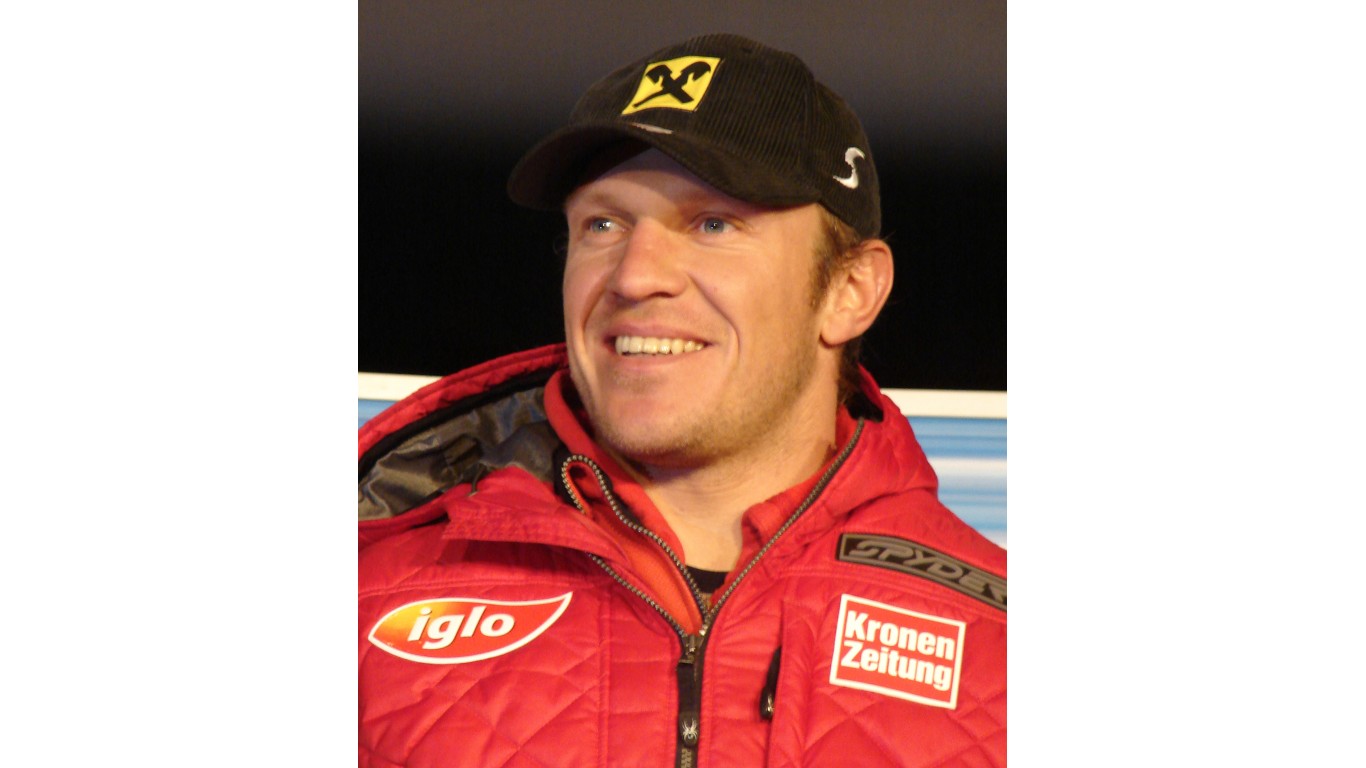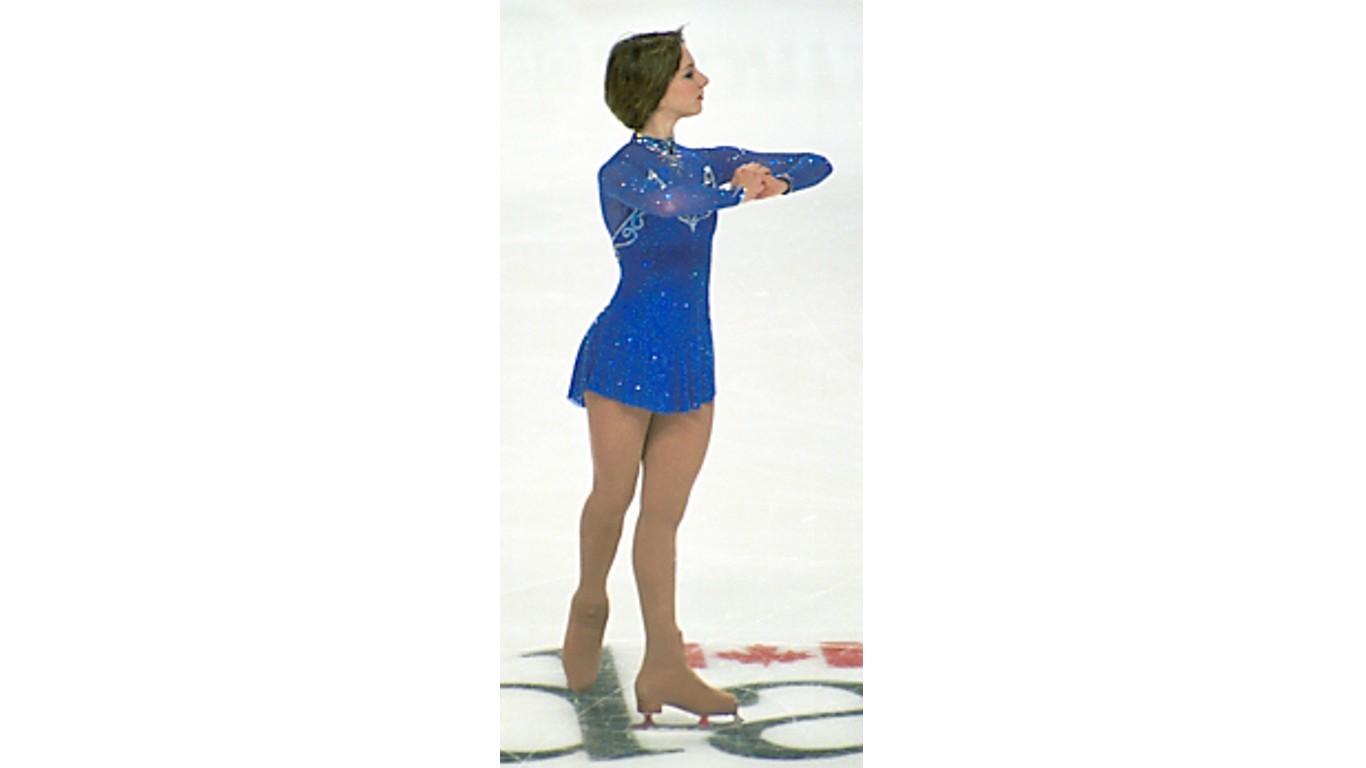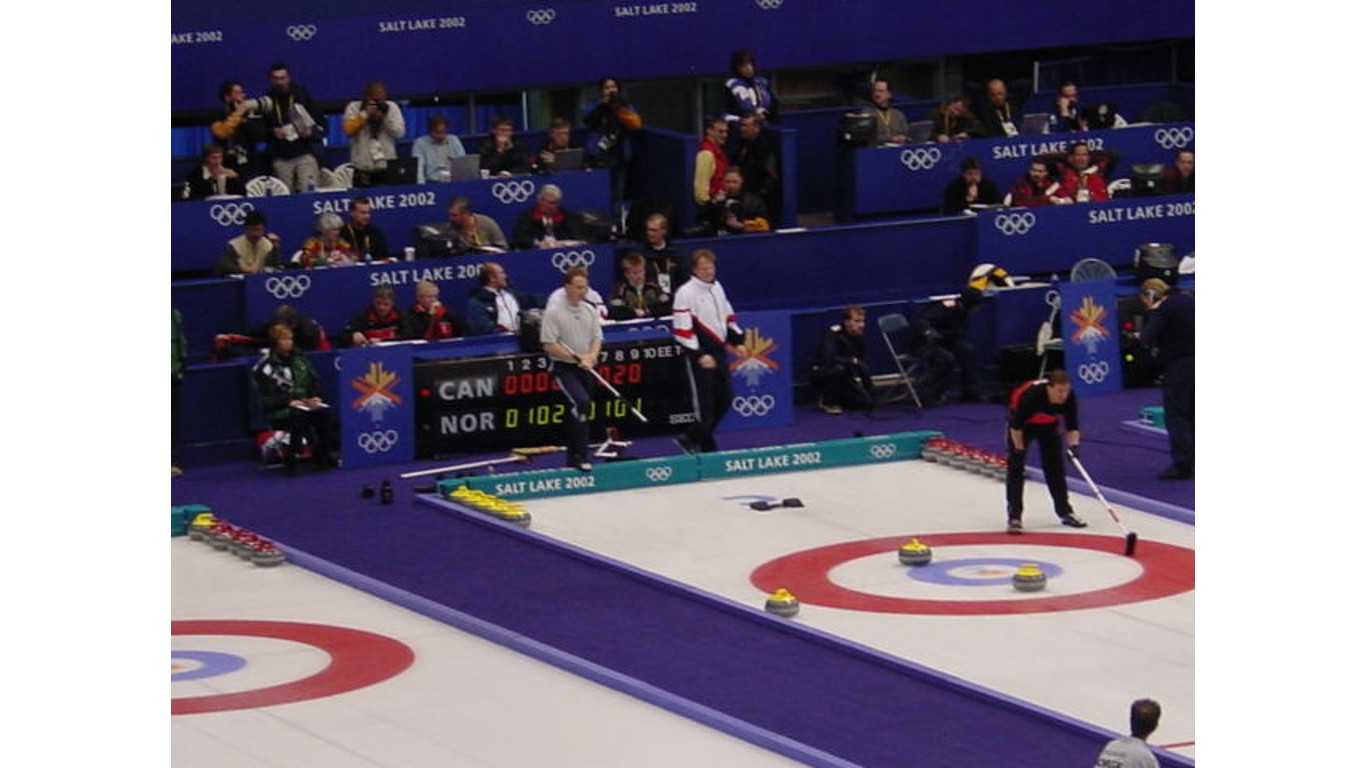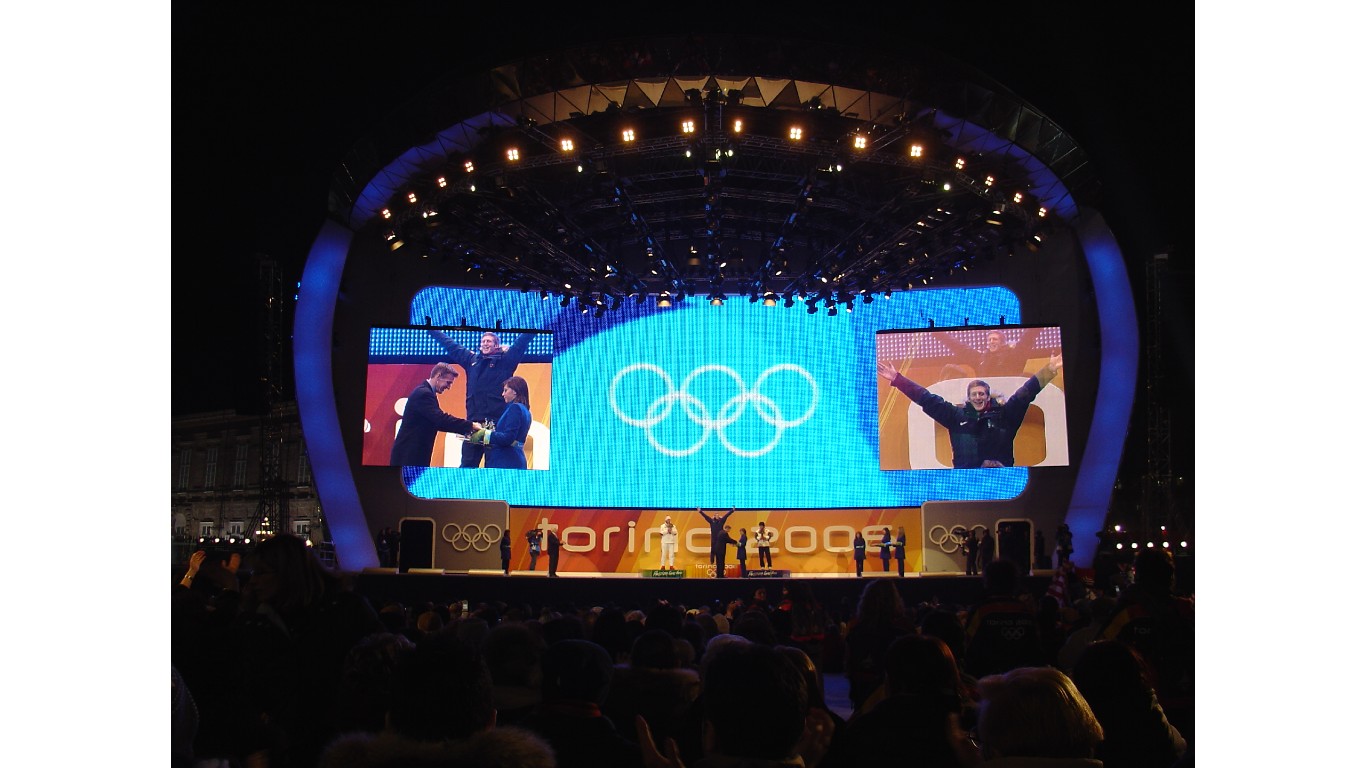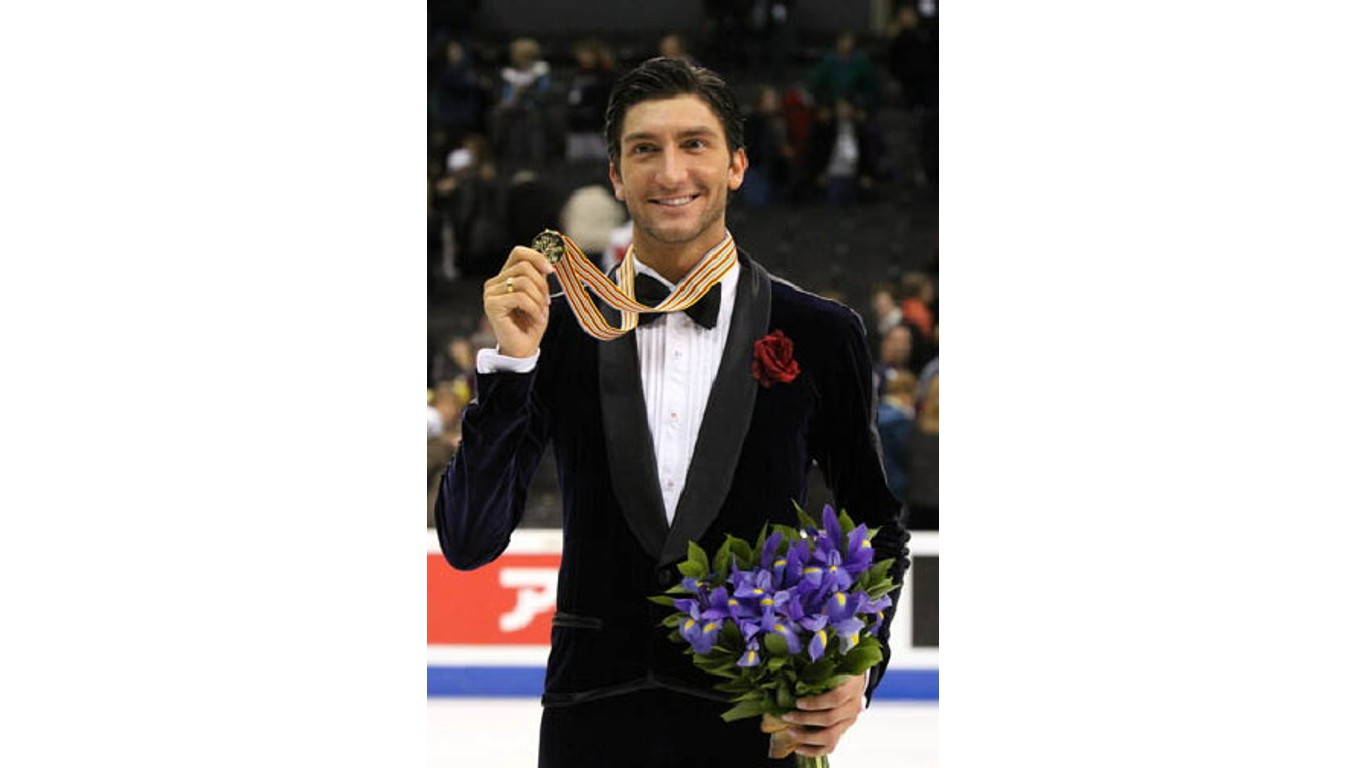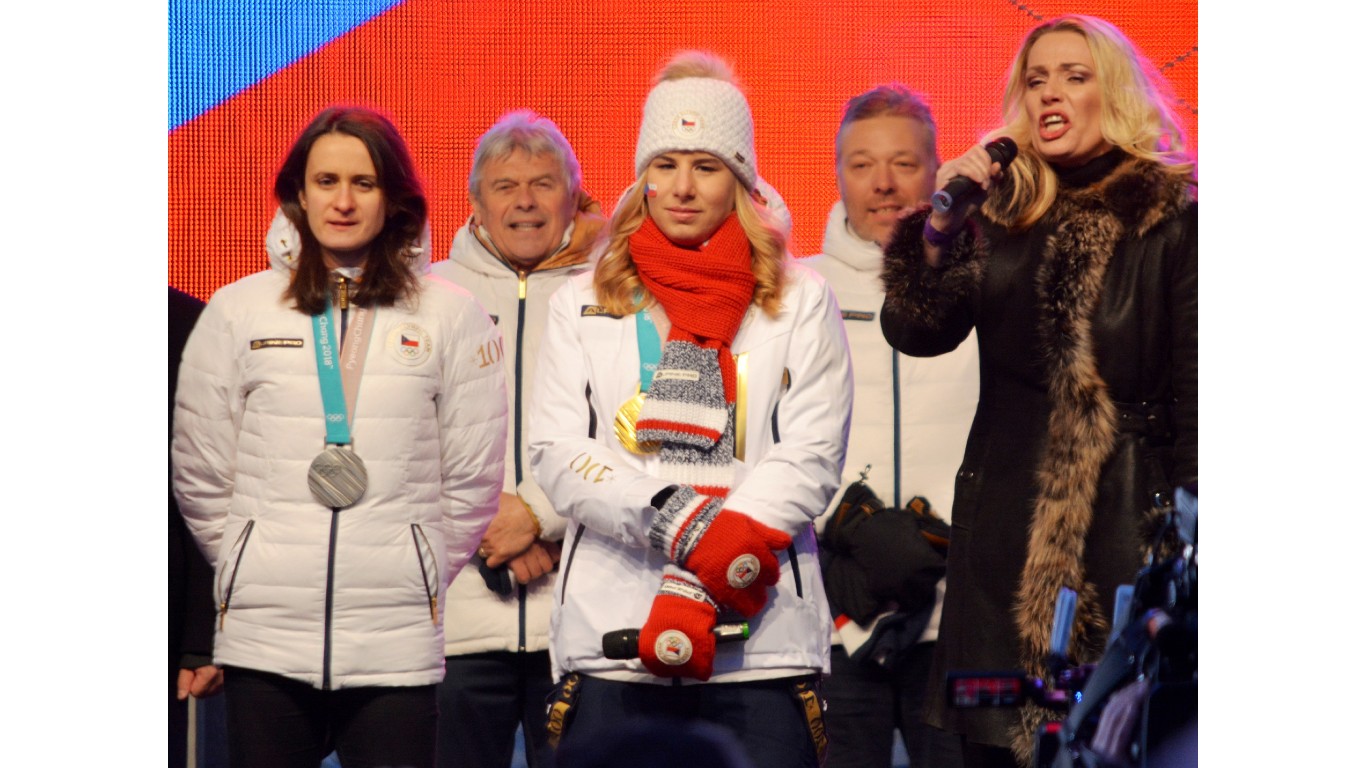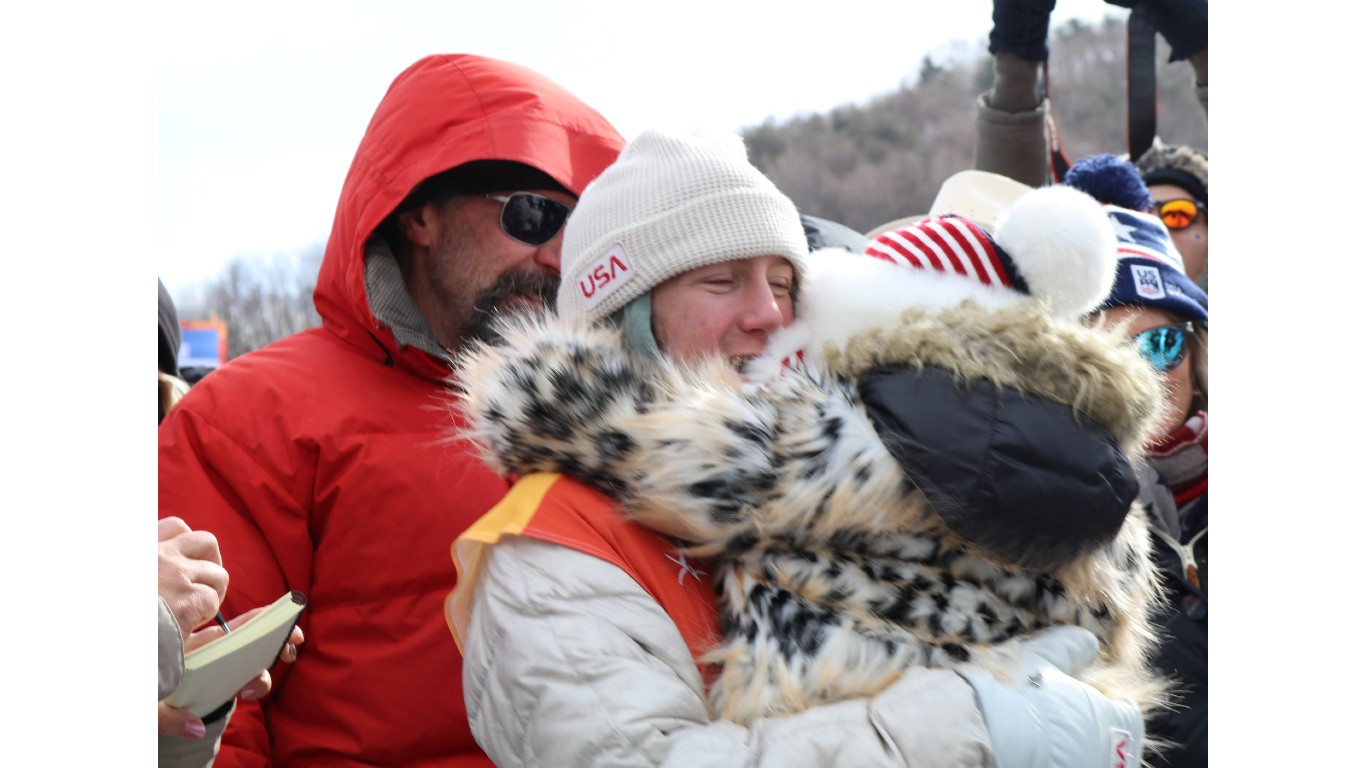Viewers of the Winter Olympics are thrilled by the exploits of multi-medal winners like Dutch speed skater Ireen Wüst. They appreciate the determination, if not necessarily the skill, of competitors such as Michael David Edwards, an English ski jumper who finished last in the 1988 Winter Games. They’re inspired by triumphs over injuries, such as that by American skier Picabo Street, and saddened by the curtain calls of athletes such as snowboarder Shaun White and possibly Charlotte Kalla of Sweden, who’s won nine medals in cross-country skiing. (These are the top Winter Olympics medal winners of all time.)
And the Winter Olympics always have their share of surprises that delight or shock the sports world. To compile a list of 15 of the biggest examples, 24/7 Tempo reviewed archived material from the official Olympic Games website as well as news articles about the Games going back decades.
Surprising results come in various ways at the Winter Olympics. Czech snowboarder Ester Ledecka borrowed a pair of skis from a rival to win a gold medal in skiing’s super-G event. A scorer’s error kept American Anders Haugen from winning a bronze medal at the 1924 Winter Olympics until the wrong was corrected 50 years later. Steven Bradbury won the short-track speed skating gold at the 2018 Winter Olympics because he was the only skater standing after a pileup of the other competitors.
Sarah Hughes, Oksana Baiul, and Tara Lipinski all shocked the field as teenage gold-medal winners in women’s figure skating.
In team sports, no event has produced more stunning results as ice hockey. We all know about the celebrated “Miracle on Ice” triumph of the US men over the Soviet Union in 1980, but did you know that Great Britain upended Canada to win gold in the 1936 Olympics, or that Germany came within 55 seconds of winning the gold in 2018 after defeating Canada to reach the final?
What surprises have occurred at the Beijing Olympics so far? Australia, which usually performs well in the Summer Games, set a record for its winter participation, taking home a gold, two silvers, and a bronze to date.
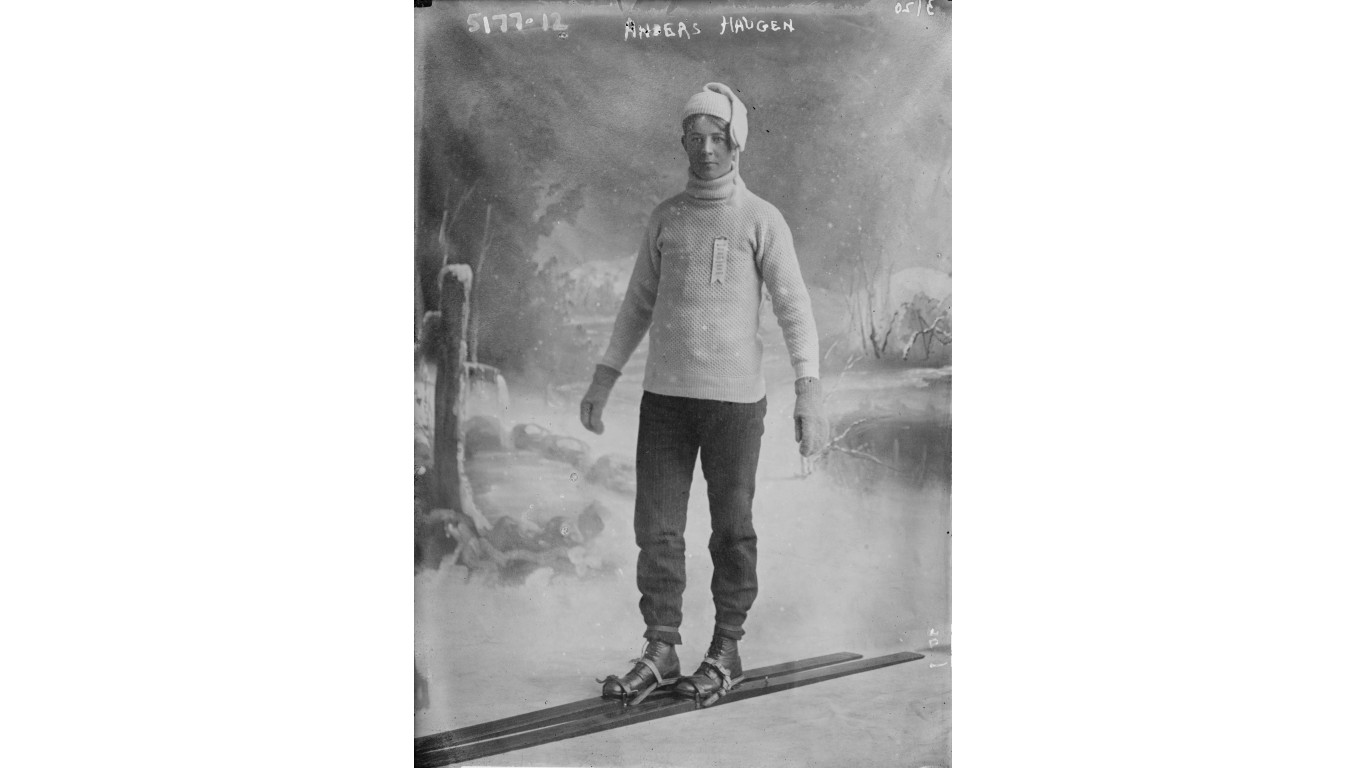
1924
> Sport: Ski jump
> Sport: American awarded bronze medal 50 years later
Anders Haugen emigrated to the United States from Norway in 1907 and competed in the inaugural Winter Olympics in 1924 in Chamonix, France. He finished fourth in the ski-jumping competition that was swept by his former countrymen, despite posting the longest jump of the day by far. Almost 40 years later, Thoralf Strømstad, a Norwegian Nordic skier who had also competed in 1924, raised the matter with sports historian Jacob Vaage. Vaage investigated and realized that Haugen, and not another Norwegian, Thorleif Haug, should have been given the bronze. In 1974, at the age of 86, Haugen was finally given his medal – presented by the daughter of the late Haug.
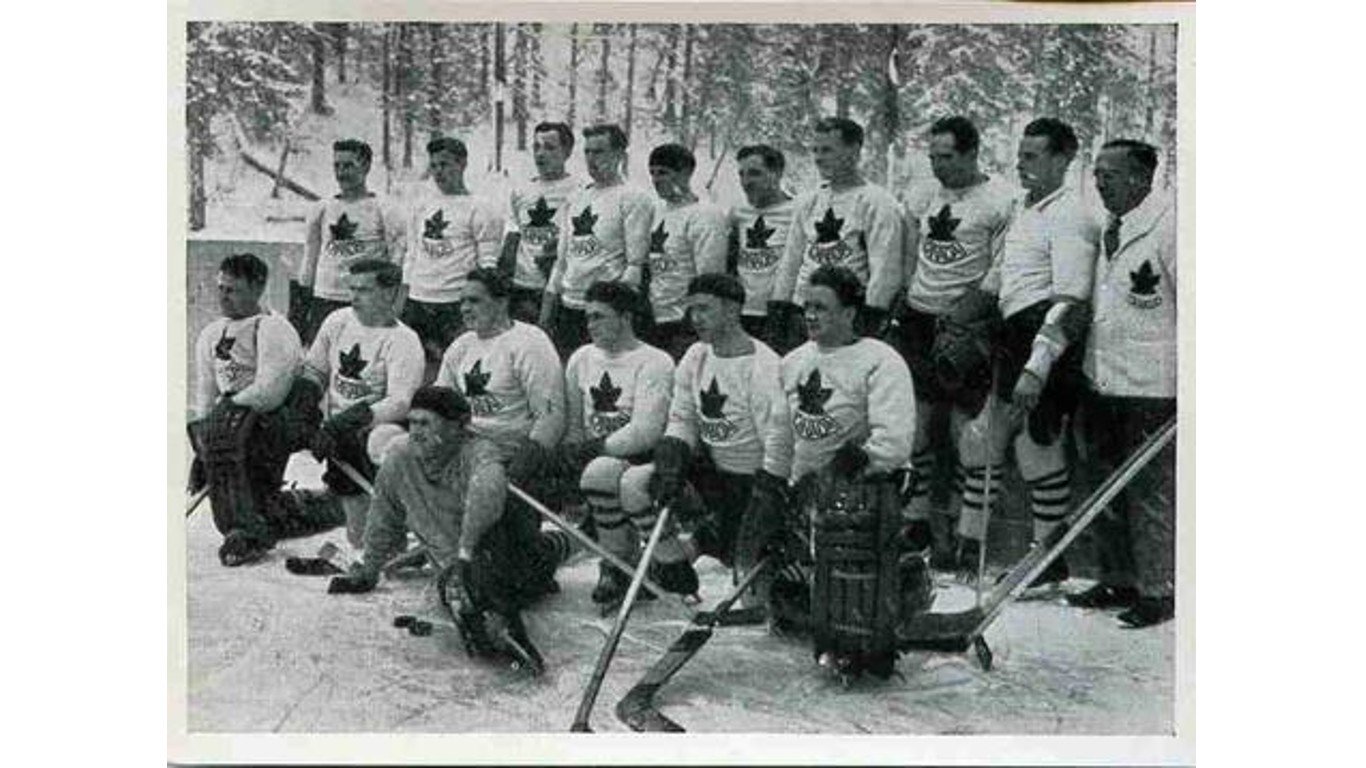
1936
> Sport: Ice hockey
> Sport: Great Britain beats Canada
Great Britain won its only ice hockey gold medal at the Winter Olympics held in Garmisch-Partenkirchen, Germany, in 1936. Until the British victory, Canada had won the ice hockey gold medal at every Winter Games. It’s not as if the British came out of nowhere. Buoyed by surging interest in the sport in the 1920s, Great Britain had won the ice hockey bronze at the 1924 Winter Olympics at Chamonix, France, and placed fourth place four years later in St. Moritz. It should also be noted that many of the players competing for Great Britain were Brits living in Canada at the time.
1980
> Sport: Ice hockey
> Sport: US beat Soviet Union
Weeks before the 1980 Winter Olympics in Lake Placid, New York, a team of amateur American college ice hockey players was trounced by the national team of the Soviet Union at Madison Square Garden. Going into the Winter Games, the US team was seeded just seventh, but they made it to the medal round and got their revenge on the Soviets by defeating them 4-3 – then going on to beat another ice hockey powerhouse, Finland, for the gold medal. The US win over the powerful Soviet Union squad became known as “the Miracle on Ice” and was seen as a meaningful Cold War victory, as President Jimmy Carter had just announced that the US was going to boycott the Summer Olympics to be held in Moscow later in 1980 in protest of the Soviet invasion of Afghanistan.

1994
> Sport: Figure skating
> Sport: Ukrainian Oksana Baiul wins gold
Oksana Baiul overcame personal tragedy and adversity to win the gold medal in figure skating in 1994. Baiul’s father left the family when she was a child, and by 1991, her mother and grandparents had passed away and her coach soon left for Canada. Supported by a new coach, Galina Zmiyvskaya, and champion figure skater Victor Petrenko, Baiul won the world figure-skating title in 1993. The following year, the 16-year-old Baiul narrowly defeated American skating star Nancy Kerrigan to win the gold in Lillehammer, Norway.
1998
> Sport: Figure skating
> Sport: 15-year-old Tara Lipinski wins gold
By winning the figure-skating gold medal at the 1998 Winter Olympics in Nagano, Japan, at the age of 15, Tara Lipinski became the youngest person to ever win the honor – defeating heavily favored American skater Michelle Kwan in the process.
Lipinski accomplished her feat by becoming the first female skater to execute the difficult triple loop-triple loop combination jump at either a world championship event or the Olympics.
1998
> Sport: Super-G and Giant Slalom
> Sport: Overcoming major crash to win 2 gold medals
Nicknamed “The Herminator,” Austrian skier Hermann Maier crashed in spectacular fashion during the downhill competition at the 1998 Winter Olympics in Nagano, Japan. Despite bruises to his knee and shoulder, Maier insisted that he could still compete. Weather delays gave him time to recover, and he went on to win the super-G and giant slalom events. After later injuries interrupted his career, Maier would revive again and win silver and bronze medals in the super-G and giant slalom at the Turin Winter Olympics in 2006.
2002
> Sport: Short-track speed skating
> Sport: Massive crash with only one man left standing
The short-track final at the 2002 Winter Olympic Games in Salt Lake City featured some of the greatest speed skaters in the world – South Korea’s Ahn Hyun-Soo; America’s Apolo Anton Ohno; Li Jiajun of China, who had won the event four years earlier; and Mathieu Turcotte of Canada. Steven Bradbury of Australia, not considered among skating’s elite, was also in the field. Once the race started, Bradbury became separated from the group of four, who all wiped out scrambling to get to the finish line first. Bradbury was the last man skating and won Australia’s first-ever gold medal in a winter Olympics.
2002
> Sport: Figure skating
> Sport: Sarah Hughes beats Michelle Kwan to win gold
Sixteen-year-old Sarah Hughes shocked the sports world by winning the women’s figure-skating gold medal at the 2002 Winter Olympic Games in Salt Lake City.
Hughes defeated a strong field, including Michelle Kwan, who had won silver four years earlier in Nagano and was a three-time and reigning world champion. Hughes was in fourth place after the short program, and until the 2002 Winter Games, no female figure skater had ever rallied from that far back to win gold. In the free-skating portion of the program, Hughes executed a double axel, landed a triple toe loop-triple loop and a triple salchow-triple loop combination, the first combination of that kind in the history of the competition. After Kwan and fellow American Sasha Cohen fell and Russia’s Irina Slutskaya performed below expectations, Hughes took the gold.
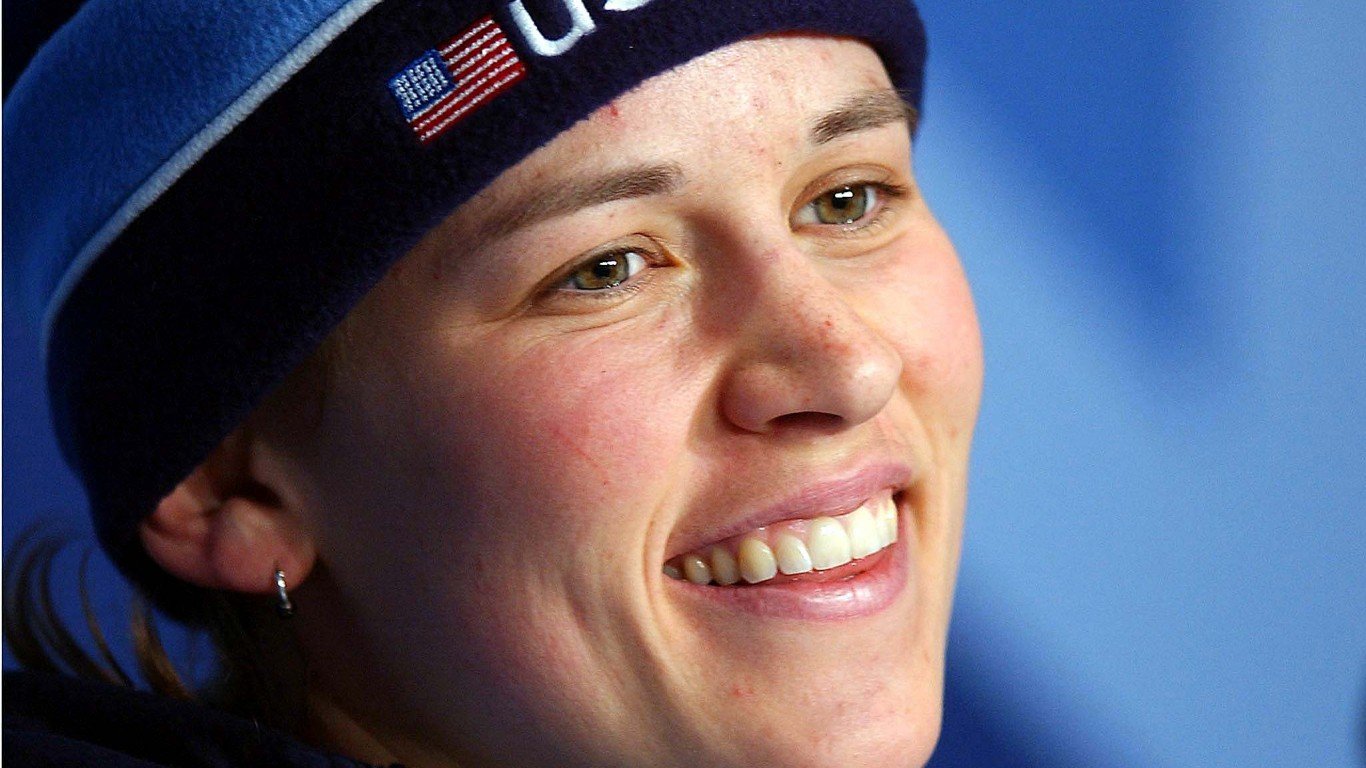
2002
> Sport: Bobsled
> Sport: Jill Bakken and Vonetta Flowers win
At the 2002 Winter Olympic Games in Salt Lake City, Vonetta Flowers became the first Black athlete to win a gold medal at the Winter Olympics as a brakewoman on a bobsled with partner Jill Bakken. Flowers had been a sprinter and long jumper at the University of Alabama at Birmingham but stopped competing after failing to make the US team for the 1996 and 2000 Olympics. She transitioned to the bobsled after seeing a flyer suggesting that track-and-field athletes try out for the sport.
2002
> Sport: Curling
> Sport: Great Britain women’s team wins
By defeating Switzerland, 4-3, Great Britain’s women’s curling team won the gold medal at the 2002 Winter Olympic Games in Salt Lake City. It was the first Winter Olympics gold for Great Britain since Jayne Torvill and Christopher Dean won the ice-dancing top prize in 1984 at the Winter Olympics in Sarajevo, Yugoslavia.
Though most often associated today with Canada, the sport originated in Scotland, and became an official Winter Olympics sport in 1998 at Nagano.
2006
> Sport: Ice hockey
> Sport: Sweden’s women beat the US
Since 1998, when women’s hockey became a Winter Olympics sport, the United States and Canada have dominated the rink, with either country winning or placing second in the event. But that changed in the 2006 Winter Olympics in Turin, Italy. In the semifinals, Sweden, behind the determined goaltending of Kim Martin, upset the US in a shootout, to earn a berth in the final against Canada (which won the gold). It was the first time the American women had lost to a team other than Canada since women’s hockey had become an international sport in 1990. the US took home a bronze.
2010
> Sport: Figure skating
> Sport: Evan Lysacek beats Evgeni Plushenko to win gold
Evan Lysacek of the United States defeated Evgeni Plushenko of Russia to win the gold medal in men’s figure skating in a major upset at the 2010 Winter Olympics in Vancouver. It was the first figure-skating gold medal for the United States since Brian Boitano finished first at the 1988 Calgary Winter Olympic Games. Russian skaters had won the event since then. Lysacek had finished in fourth place at the Turin Winter Games in 2006.
2018
> Sport: Alpine Skiing Super-G
> Sport: Snowboarding specialist Ester Ledecka wins gold
Ester Ledecka had made her name as a world champion snowboarder, but no one expected her to be a factor in skiing’s super-G event at the 2018 Winter Olympic Games in PyeongChang, South Korea. Using skis borrowed from American star Mikaela Shiffrin, the Czech athlete stunned the field by winning the event. Ledecka, the first person to compete in snowboarding and skiing in the same Olympics, nipped Austria’s Anna Veith by one-hundredth of a second. Veith had been the defending Olympic champion in the event and NBC had named her the winner after the top 20 skiers had completed the course.
2018
> Sport: Slopestyle snowboarding
> Sport: Red Gerard wins gold
Seventeen-year-old Red Gerard of the United States shocked the sports world at the 2018 Winter Olympic Games in PyeongChang, South Korea, by winning the slopestyle snowboarding event. He was America’s youngest gold-medal winner at the 2018 Winter Olympics. Gerard also competed at the Beijing Winter Olympics this year and finished fourth in the same event.
2018
> Sport: Ice hockey
> Sport: Germany eliminates Sweden and Canada
The Canadian men’s national ice hockey team suffered a loss at the hands of an unheralded German squad at the 2018 Winter Olympic Games in PyeongChang, South Korea. The nine-time gold medalists, competing without NHL players, were stunned by Germany, 4-3, in the semifinals. The German team had defeated Switzerland and Sweden in overtime before upsetting Canada. Germany came within 55 seconds of winning the gold before the Russian squad tied the game and then won in overtime.
Canada avenged the loss in Beijing this year by beating Germany 5-1.
